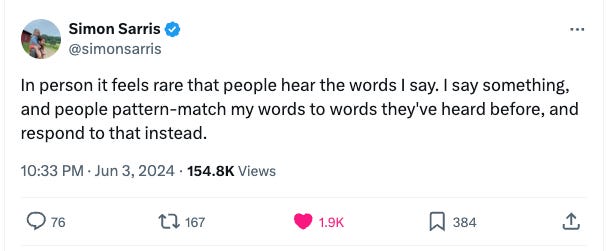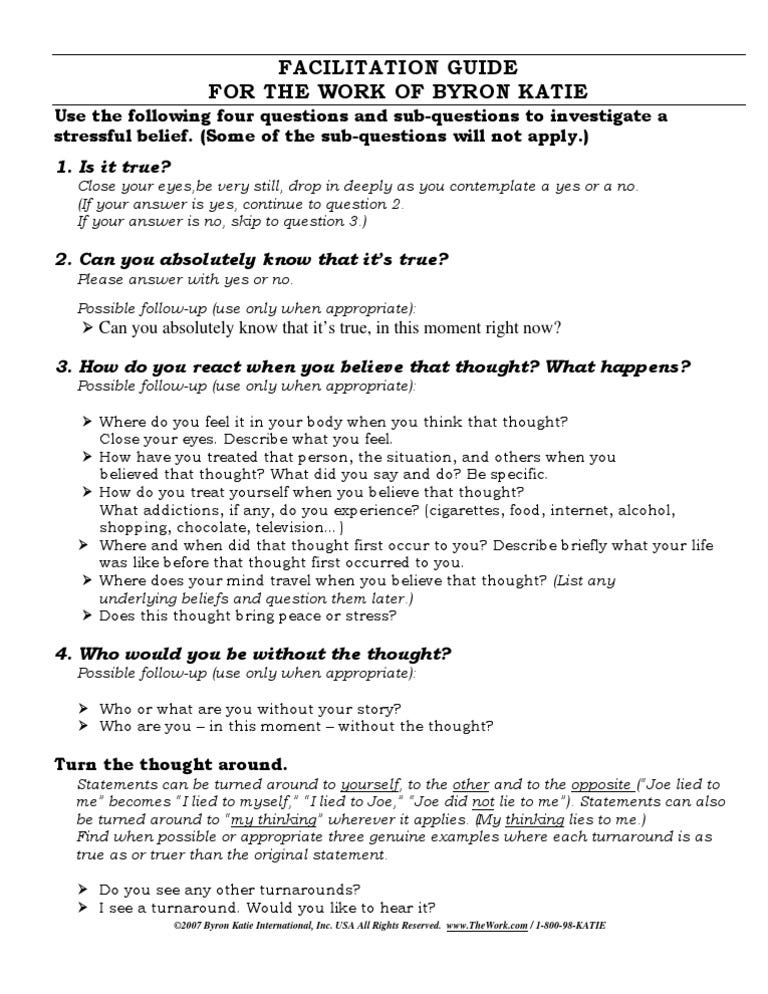How to have rizz: a protocol for connecting with others | #54
just be yourself.. unless yourself sucks, then go to therapy (or something like it) AND THEN be yourself
Hey everyone! I’ve been thinking about charisma and connecting with others a lot lately. Some people have told me I have rizz, so I figured I’d write down everything I know about it to see what people think.
Maybe people might find it helpful. In this issue:
Rizz: what people do wrong
Being a wallflower
Acting inconsistent with who you are
Solipsistic or antisocial behavior
Invalidating their own feelings
Invalidating other peoples’ feelings
What to do instead
Avoid emotional abuse
Make your character obvious
Make it obvious that you see and understand other peoples' characters
Be responsive
Do things that approximate going to therapy
maybe you’re not happy and thus not enjoyable to be around
maybe you need better boundaries
maybe you have trouble communicating with people
maybe you have bad self-talk or a bad self-image
maybe you have trouble paying attention
maybe you have trouble empathizing with people
Rizz: what people do wrong
Being a wallflower
People like characters. Characters have desires, feelings, tastes, and points of view. Traits people feel, relate to, and remember. Shyness means not putting anything out there that people can grab onto.
Acting inconsistent with who they are
Everyone you meet will create some kind of narrative about you. Knowing this, you could change your behavior to try and control that narrative. But, that tends to give people the ick.
Some examples of narrative manipulation include
bragging
excessive flattery (think: sleezy car salesman)
withholding your honest opinion
not owning your feelings
not setting boundaries
People like transparency. Most attempts to fight transparency give people the ick. In fact, a lot of stuff becomes creepy only because people try to hide it.
Solipsistic or antisocial behavior
There are many known examples of antisocial behavior, like
being willing to litter
not returning your grocery cart after shopping
treating your server rudely
susceptibility to road rage
interrupting people often
redirecting conversations to a topic of your choice often
Basically, any behavior that says
I'm the only person that exists
other peoples' needs are irrelevant to me, and/or
anything that prevents me from getting my needs met is a slight against me
will give people the ick.
Invalidating their own feelings
If someone isn't a good steward of their feelings, it's unlikely they'll be a good steward of yours. It's harder to have empathy for others if you don't have it for yourself. At least, in my experience.
Invalidating other peoples' feelings
As far as I know, no one can control how they feel. We can do things that influence how we feel, but we can't feel stuff on command.
Hence, telling someone they shouldn't feel a certain way is almost always unwelcome. Requiring or expecting someone to feel a certain way is likely to backfire.
Example 1: how to comfort someone: the bad way
Let’s say something bad happened to someone.
If you try and convince them it's not that bad, they're probably going to feel like you don't understand them. Like you're not trying to meet them where they are.
If you try and rush them to get over it, it's likely to piss them off. It's going to make them feel like you don't accept their feelings. Which will make them feel disconnected from you.
Example 2: the "women want you to listen, not solve their problems" meme
I think it started with this video. It's a comedy sketch where a woman has a literal nail in her head and she's complaining to a guy about the pain it's causing.
The guy responds by saying, "Why don't you take the nail out of your head?" And the woman gets frustrated, asking why he can't just listen to her.
Modern Family (S2E17) references it as well.
It's the same idea as Example 1. By jumping to problem solving mode, the guy is
not allowing space for the feelings to exist
not listening to what she actually needs in that moment
not giving her autonomy to solve the problem on her terms
I suspect it happens to women more often, but it isn't a gendered thing. I'm sure everyone has experienced unsolicited, unwelcome advice at some point.
What to do instead
These are the guidelines I try to follow.
Avoid emotional abuse
I was listening to a podcast with Ali Abdaal and Joe Hudson a few months ago. Joe casually dropped a neat definition of emotional abuse. Abuse might be too strong of a word, but I love the sentiment.
He defined emotional abuse as either
holding someone else responsible for your feelings, or
telling someone (including yourself) their feelings are invalid
Doing one of those things is the root of what a lot of people get wrong when trying to connect with people.
If you avoid doing both of those things, you're already pretty far.
Make your character obvious
Make your desires, feelings, and point of view known. Bonus points if you Show, Don't Tell.
This is what people are looking for when they ask you something like, "Tell me about yourself" or "What's your story?"
I'm an accountant.
says nothing!
Why are you an accountant? How'd you become one? How do you feel about it? What's it like?
I'm an accountant. My parents were accountants and they seemed happy so I took accounting classes to get a feel for it. It made business make so much sense to me, and it seemed useful, so I stuck with it. People think it's boring, but it allows you to see the interesting stories behind the spreadsheets. And I love that.
Bam. And from there, so many jumping off points for further conversation.
What's something that took you a long time to understand?
What's the latest interesting story you can think of?
So do you think the stereotype that accountants are boring isn't fair?
Further reading: Good conversations have lots of doorknobs
Make it obvious that you see and understand other peoples' characters
Pay attention to people.
"You're doing this, does that mean you feel X?"
"I figured you'd be hungry, so I brought you A Thing That You Like"
"I bet you're pretty bored right now, huh?"
People love it when you make guesses about them if you do it with intentionality and humility.
If it comes from a place of caring and curiosity, in my experience it's almost always welcomed. Bonus points for Show, Don't Tell here as well.
If you're wondering what Show, Don't Tell means, it means doing something that implies your guess. As opposed to just stating it.
For example, if someone's in a hurry, instead of saying, "you seem in a hurry," making a joke about it, like, "whoa, OK Usain Bolt, the Olympics aren't for another month!"
A good recipe is to
take something that sticks out about them,
make or reference a character based on that trait, and
playfully infer their thoughts, intentions, or actions based on that trait
Be responsive
Sasha Chapin wrote in more detail here what this means, but in summary:
listen to understand, don't listen to respond
embrace support responses (adding onto what they said) more often than switch responses (changing the subject)
The deeper you consider what people are telling you, the more emergent your responses will be. You'll respond faster and more sincerely.
Many people I'm getting to know tell me very personal things very quickly. They say things like, "I've never told anyone that," or, "Wow, I didn't expect to say all that."
I believe that my responsiveness is the main reason for that. I care what they have to say, and they can tell because I listen intently.
Do things that approximate going to therapy
You can summarize most of what I've said so far with one sentence: be yourself and listen to people.
Your knee-jerk reaction might be something like..
What if myself sucks??
That's entirely possible!
It's possible you've "tried being yourself" and it "didn't work" because of a variety of reasons.
Maybe you are solipsistic or antisocial.
Maybe your relationship with your parents wasn't great. The lesson you took from childhood was that being yourself isn't a good idea.
Maybe you have a victim mentality. Or maybe your life is genuinely hard, so you're not all sunshine and rainbows all the time.
It could even be that you don't suck, you're just around people that suck.
Who knows, it's not super important.
The point is: there are probably things that prevent you from connecting with people.
Therapy can help, but if you can't find a good therapist or it's out of your budget, do something like therapy. Read visakan veerasamy’s Introspect.
Maybe you're not happy and thus not fun to be around. Figure out what it is and fix it. Sometimes that's easier said than done. For those times, I assembled a guide/checklist for how to have more agency in life.
I ask myself those questions when I'm facing tough problems. I have yet to walk a way without increased clarity when I sit down and try to answer them.
Maybe you need better boundaries. Here's a good tweet thread on what boundaries actually are, and how to set them.
Maybe you have trouble communicating with people. Try using this Nonviolent Communication template.
Maybe you have bad self-talk or a bad self-image. Identify the beliefs that make you unhappy and fill out Byron Katie's The Work worksheet (image below) for each belief. Familiarize yourself with the most common cognitive distortions.
Maybe you have trouble paying attention. Try putting limits on your video game time, social media time, etc. Try meditating. Try... cognitive games. I don't have a lot of ideas here, to be honest.
Maybe you have trouble empathizing with people. Travel to places where people are truly suffering. Go volunteer and experience the joy of helping people. Ask people about their lives, take in their experiences, and compare them to your own.
Hope this helps!





This was great. Love the "I'm an accountant" worked example. Giving people things to latch onto in conversation is something I want to get better at.
I think a lot of people (including me) take a defensive approach to offering up information about themselves. Not sure why.